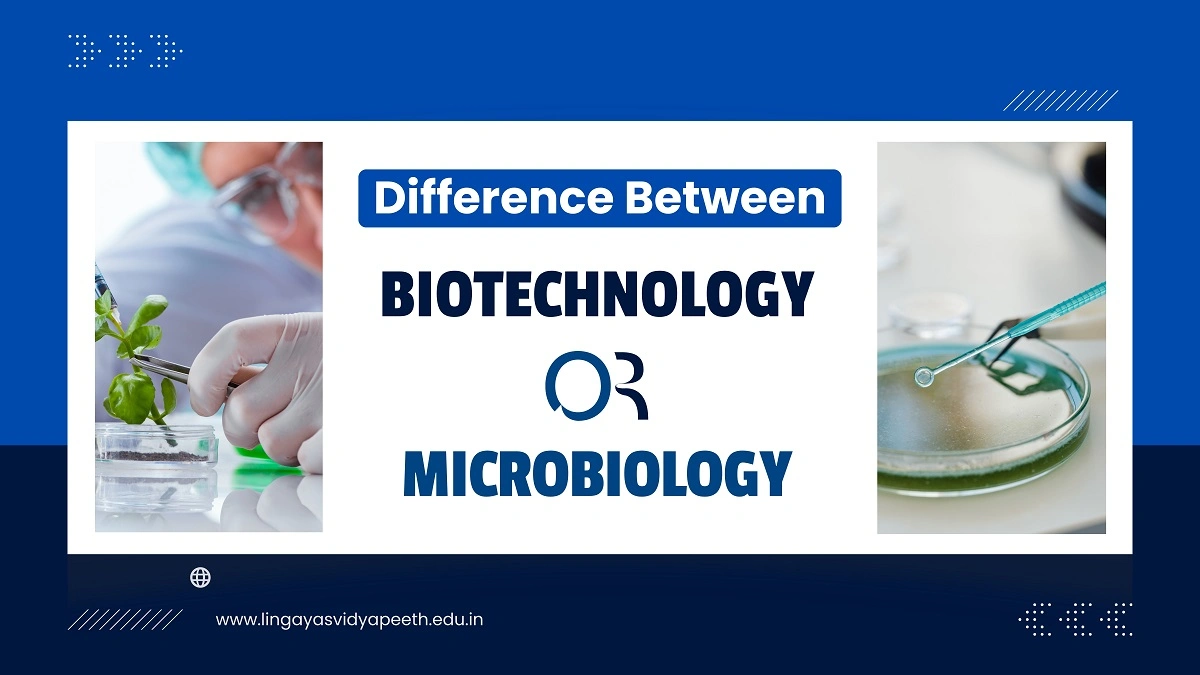Home » Difference Between Biotechnology and Microbiology

Do you love science and wonder about the difference between Biotechnology and Microbiology? These fields are super cool, but choosing one for your future might feel hard. Don’t worry! This blog explains both in easy words for students who wish to start their college journey.
Whether you’re dreaming of being a scientist or just curious, we’ll help you understand these fields, why they’re awesome, and how Lingaya’s Vidyapeeth is a great place to learn B.Sc. Hons. Biotechnology. Let’s jump in!
Before we talk about the difference between Biotechnology and Microbiology, let’s see what each one means.
Both are part of biology, but the difference between Biotechnology and Microbiology is that biotechnology makes things, while microbiology studies tiny creatures.
The difference between Biotechnology and Microbiology can be tricky, so here’s a fun table to make it clear:
| Topic | Biotechnology | Microbiology |
| What It Is | Uses living things to make stuff like medicines or better crops. | Studies tiny creatures like bacteria or viruses. |
| Main Goal | Making things to help with health, farming, or factories. | Learning about tiny creatures and how they act in nature or sickness. |
| What It Covers | Lots of stuff like genes and building new things. | Mostly about tiny creatures and what they do. |
| Tools | Uses things like gene-changing tools and DNA machines. | Uses microscopes and tests to look at tiny creatures. |
| What It Does | Makes medicines, better crops, clean fuels, or fixes pollution. | Studies sickness, checks food safety, or makes medicines like antibiotics. |
| Study Time | 3 years for B.Sc. Biotechnology. | 3 years for B.Sc. Microbiology. |
| School Subjects | Genes, biology, and building science stuff. | Bacteria, viruses, body defenses, and tiny creature genes. |
| Jobs | Work in medicine, farming, or science companies. | Work in hospitals, food safety, or science labs. |
| Skills | Solving puzzles, using tools, and thinking of new ideas. | Watching closely, doing experiments, and lab work. |
| Need for Workers | Growing super-fast in India, worth $100 billion by 2025. | Lots of jobs in health and food safety. |
| Starting Pay | ₹3-5 lakh a year (more with practice). | ₹2.5-5 lakh a year (depends on the job). |
| Science Work | Making new things like medicines or fuels. | Learning how tiny creatures work and affect us. |
This table makes the difference between Biotechnology and Microbiology easy to understand, showing how they’re different in goals, tools, and jobs.
Picking between B.Sc. Biotechnology and B.Sc. Microbiology depends on what you think is fun. Here’s what each gives you:
Lingaya’s Vidyapeeth has a super fun B.Sc. Hons. Biotechnology program with real practice, cool labs, and job connections, getting you ready for a bright future.
To start either program, you need to follow some rules:
Lingaya’s Vidyapeeth makes joining easy with merit-based admission and clear help for biotech students.
Even with the difference between Biotechnology and Microbiology, they share some stuff:
These shared things make both fields exciting, but the difference between Biotechnology and Microbiology is in what they aim to do.
The difference between Biotechnology and Microbiology makes each one special, but which is better? It’s up to you:
Lingaya’s Vidyapeeth’s B.Sc. Hons. Biotechnology program is great for sparking your ideas with awesome labs and super teachers.
Both fields have fun jobs. Here’s a peek at roles and pay:
India’s biotech world grows 20% every year, giving more jobs to biotechnologists, while microbiologists are needed in health and science.
The difference between Biotechnology and Microbiology shows in their jobs:
Both jobs are awesome, but biotechnologists create things, while microbiologists study tiny creatures.
| Aspect | Biotechnology | Microbiology |
|---|---|---|
| Good Stuff |
|
|
| Tough Stuff |
|
|
The difference between Biotechnology and Microbiology is all about what you like:
If biotechnology sounds cool, Lingaya’s Vidyapeeth’s B.Sc. Hons. Biotechnology has fun labs, job connections, and classes made for winning.
Choosing the right school is as big as picking a field. Lingaya’s Vidyapeeth in Faridabad is perfect for biotech fans. Here’s why:
At Lingaya’s Vidyapeeth, you’ll learn to be a star in the biotech world. Ready to start? Apply now and explore the difference between Biotechnology and Microbiology with a class that opens doors!
We learn about the difference between Biotechnology and Microbiology: biotechnology makes stuff with living things, while microbiology studies tiny creatures. Both have cool jobs, but biotechnology’s bigger ideas and creativity make it a favourite. Whether you want to make medicines or study tiny creatures, Lingaya’s Vidyapeeth’s B.Sc. Hons. Biotechnology program is the best place to begin.
Also Read
Difference between money market and capital market
Difference between advertising and publicity
Difference between marketing and selling
Difference between formal and informal communication
RECENT POSTS
CATEGORIES
TAGS
Agriculture Agriculture future AI Architecture artificial intelligence Bachelor of Commerce BA English BA Psychology BTech AIML BTech CSE BTech cybersecurity BTech Engineering Business management career Career-Specific Education career guide career option career scope Civil engineering commerce and management Computer Science Computer science engineering Data science degree education Engineering Engineering students English Literature english program Fashion Design Fashion design course Higher Education Journalism journalism and mass communication law Law career Machine Learning mathematics MBA MBA specialization Mechanical Engineering Pharmacy Psychology Research and Development students
LV only conducts physical/online verification of any document related to examination on the following email id:
It is important to note that the following email IDs and domains are fraudulent and do not belong to our university.